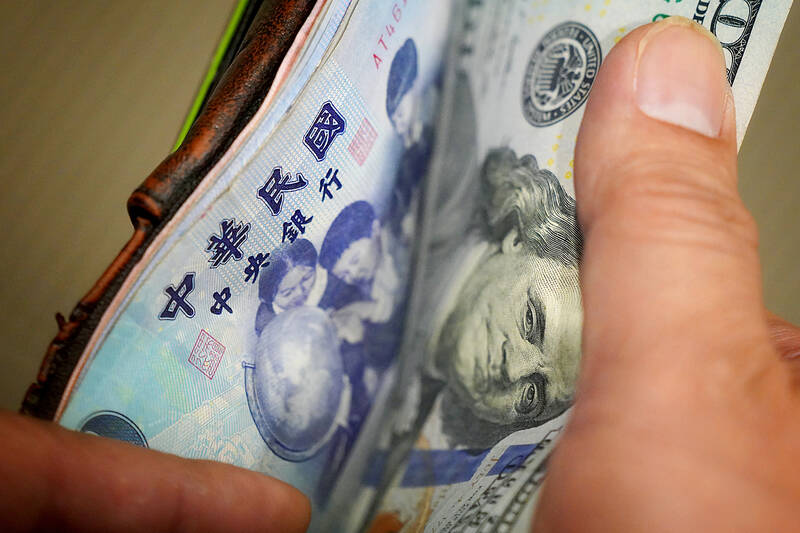Losses at Taiwan’s biggest insurers almost doubled last month from a month earlier as historic gains in the New Taiwan dollar dented the value of their foreign investments.
Losses for four of the largest reached a combined NT$35.35 billion (US$1.2 billion), company statements released yesterday showed. Among them, Shin Kong Life Insurance Co (新光人壽) posted the largest loss at NT$15.38 billion.
Fubon Life Insurance Co’s (富邦人壽) losses almost quadrupled from a month earlier to NT$9.14 billion, while losses at Taiwan Life Insurance Co (台灣人壽) doubled to NT$2.83 billion, and KGI Life Insurance Co’s (凱基人壽) losses swelled to NT$7.997 billion.

Photo: CNA
Bucking the trend, Cathay Life Insurance Co (國泰人壽) posted a small profit of NT$440 million, saved by its hedging operations, as did Nan Shan Life Insurance Co (南山人壽) with a profit of NT$13 million.
The NT dollar spiked 6.98 percent against the US dollar last month — mostly over two days at the start of the month — showing the largest monthly increase since April 1989. That heaped pressure on the life insurance industry, which already had about US$4 billion of foreign exchange losses in the first four months of this year.
“The detrimental impact on Taiwanese insurers’ earnings, book value, capital positions and this year’s dividend policies is unlikely to be fully mitigated and not fully reflected by current valuations,” said a note by JPMorgan Chase & Co analysts, including Jemmy Huang (黃聖翔), who has revised down earnings forecasts and price targets for the sector.
Cathay Life and Fubon Life have said they would increase currency hedging and take advantage of a recently introduced rule giving them more flexibility in setting aside reserves. The Financial Supervisory Commission is also considering allowing insurers to use a rolling average for exchange-rate levels when reporting results, reducing the impact of sudden swings.
“The [New] Taiwan dollar remains strong, so it might be early to turn too bullish on insurers’ earnings in the near term,” Bloomberg Intelligence analyst Steven Lam said.
Still, local stocks have performed well, which could support insurers as well, he said.
According to a Fitch Ratings report on May 23, about 70 percent of the invested assets were in foreign currency, predominantly US dollar-denominated bonds.
Still, losses were relatively muted compared with November 2022, when the life insurance industry on the whole posted a NT$75.3 billion loss. During that month, the NT dollar appreciated by more than 4 percent against the greenback.
In the first five months of the year, Cathay Life posted a net profit of NT$16.11 billion, Fubon Life reported a net profit of NT$15.81 billion, Nan Shan Life earned NT$3.12 billion and Taiwan Life booked NT$1.45 billion in profit.
Meanwhile, KGI Life reported cumulative losses of NT$1.39 billion, and Shin Kong Life’s losses totaled NT$30.25 billion in the first five months, company data showed.
Additional reporting by staff

Real estate agent and property developer JSL Construction & Development Co (愛山林) led the average compensation rankings among companies listed on the Taiwan Stock Exchange (TWSE) last year, while contract chipmaker Taiwan Semiconductor Manufacturing Co (TSMC, 台積電) finished 14th. JSL Construction paid its employees total average compensation of NT$4.78 million (US$159,701), down 13.5 percent from a year earlier, but still ahead of the most profitable listed tech giants, including TSMC, TWSE data showed. Last year, the average compensation (which includes salary, overtime, bonuses and allowances) paid by TSMC rose 21.6 percent to reach about NT$3.33 million, lifting its ranking by 10 notches

Popular vape brands such as Geek Bar might get more expensive in the US — if you can find them at all. Shipments of vapes from China to the US ground to a near halt last month from a year ago, official data showed, hit by US President Donald Trump’s tariffs and a crackdown on unauthorized e-cigarettes in the world’s biggest market for smoking alternatives. That includes Geek Bar, a brand of flavored vapes that is not authorized to sell in the US, but which had been widely available due to porous import controls. One retailer, who asked not to be named, because

SEASONAL WEAKNESS: The combined revenue of the top 10 foundries fell 5.4%, but rush orders and China’s subsidies partially offset slowing demand Taiwan Semiconductor Manufacturing Co (TSMC, 台積電) further solidified its dominance in the global wafer foundry business in the first quarter of this year, remaining far ahead of its closest rival, Samsung Electronics Co, TrendForce Corp (集邦科技) said yesterday. TSMC posted US$25.52 billion in sales in the January-to-March period, down 5 percent from the previous quarter, but its market share rose from 67.1 percent the previous quarter to 67.6 percent, TrendForce said in a report. While smartphone-related wafer shipments declined in the first quarter due to seasonal factors, solid demand for artificial intelligence (AI) and high-performance computing (HPC) devices and urgent TV-related orders

MINERAL DIPLOMACY: The Chinese commerce ministry said it approved applications for the export of rare earths in a move that could help ease US-China trade tensions Chinese Vice Premier He Lifeng (何立峰) is today to meet a US delegation for talks in the UK, Beijing announced on Saturday amid a fragile truce in the trade dispute between the two powers. He is to visit the UK from yesterday to Friday at the invitation of the British government, the Chinese Ministry of Foreign Affairs said in a statement. He and US representatives are to cochair the first meeting of the US-China economic and trade consultation mechanism, it said. US President Donald Trump on Friday announced that a new round of trade talks with China would start in London beginning today,